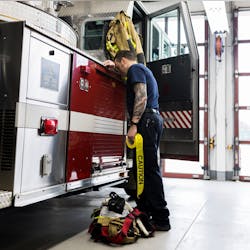Is It Me? Accidental Coping Strategies in the Fire Service
Restoring a fire company following a critical call looks different throughout the fire service. In some areas, it might mean clearing to go to the next emergency. Other jurisdictions offer tailboard debriefings that go, “You good?”, which typically prompts the auto-response, “Yeah, I’m good. You good?” Repeat said process, and many believe that a robust defusing was completed, and everyone is ready to return to service.
It has astounded me for years how firefighters can work tirelessly with life hanging in the balance one minute and can transition seamlessly back to the kitchen table to finish a lukewarm meal the next. However, after a deep dive into the subject, I realized that this oddity isn’t without a cost and that the debt often is paid by, and shared with, the people who we love the most.
Neurochemical imbalance
Did you ever approach the firehouse for your shift, and, before you entered the bay, you knew that the prior crew had a working fire? You aren’t part bloodhound, so what’s happening?
Your body is becoming hyperalert, or hypervigilant. You are about to spend the next 24 hours in uniform, in the station, never far from the apparatus and with a heightened sense of readiness for whatever is toned out. This hypervigilance is comparable to fight or flight, but knowing firefighters, we are all fight!
For the next 24 hours, the parts of your brain that control fight or flight (the amygdala and hypothalamus) remain out of neurochemical balance, with spikes when critical calls tone out and only partially reduced before tones drop again for the next call. Each call, regardless of which company responds, helps to thrust levels of neurotransmitters in the brain (cortisol) farther out of balance. Levels rise and fall during a 24-hour tour but never quite return to baseline nor ever return to where a “normal” brain functions.
So, what’s a firefighter to do?
‘Coping’ can lead to addiction
When I started the job, there were a lot of common practices that we have since removed from our culture. For example. if we went back in time to visit the 1950s firefighter, having a beer with dinner was commonplace. When I was a young firefighter in the late ’90s, they just then were removing the taps. That said, alcohol remains culturally significant in the fire service. It’s a part of every tradition and party, from probation to promotion. However, there was pathology behind what seemed like a social club mentality.
Drugs and alcohol are threats to firefighters for obvious reasons. One of the less-recognized is that they play the role of activator for the brain’s pleasure pathway.
After activation of the amygdala and hypothalamus, the brain works hard to return to homeostasis, or balance, from the increased levels of cortisol, but the brain can’t just dump extra cortisol. An increase of dopamine, or the “happy sauce,” can level the playing field. A great way for a person to increase dopamine is by consuming alcohol. Alcohol provides a way for the brain to maladaptively cope with the stress that it’s under.
However, consuming alcohol isn’t the only way to cope, and firefighters are extremely resilient at solving problems.
Stacks of pornography didn’t collect in firehouse bathrooms for decades because the fire service was a male-dominated chauvinist club. Pornography and sex also serve as maladaptive coping strategies for releasing dopamine and oxytocin (another happy sauce), thus restoring balance.
Even things that might seem completely benign can affect the dopamine response.
Central to firehouse culture and lore is members’ ability to cook—and eat! How many firefighters began their career looking like a CrossFit-type athlete and ended their career unable to pass the fitness exam that earned them their spot in their department? In that vein, this maladaptive coping strategy is extremely significant. Firefighters experience a high rate of cardiovascular emergencies on scene, yet many love to cook meals that are loaded in fats, salts and sugar.
Again, this is more brain-based than anything else. It serves a function in a firefighter’s recovery and, thus, earns a place at our cultural table. This might add new and literal meaning to the phrases “comfort food’ and “stress eating.” Think about the times when you were on duty or you were coming off when you found yourself famished or experiencing cravings.
Dopamine releases that result from food and sex serve a very important primal role for survival. However, as a firefighter’s brain tries to survive the trauma that accompanies the job, the member can struggle with addiction and dependency, and that individual’s loved ones and family foot the bill, too.
A new perspective on support
Just as important as reporting for duty mentally fit is making sure that you return home to your family in good mental condition. Two steps in the right direction are: understanding that agitation and a difficulty to relax upon return to the home are a byproduct of our fight or flight status; and acknowledging that there isn’t an off switch.
Helping your family to realize your mental state can be very helpful, but that’s difficult if you don’t first have a healthy self-awareness. This can be even more true on the bad days when you encounter a critical incident, and here is where the importance of defusing and debriefing critical incidents enters the picture.
When you see peer support approaching, don’t run and hide in a closet or under the bed. (Isn’t that what we teach kids about fires?) Do your part, if not for yourself then for the members of your family, who don’t understand your irritability but know to keep some distance after you get home from a shift.
Firefighters are willing to put in the time at the gym with weights and cardio routines. They love doing RIT drills, and they train for every possible obstacle when extracting victims. However, they rarely step foot in a counselor’s office.
If I were a betting man, I would wager that most firefighters don’t have a relationship with a counselor who they could call in a moment of crisis. We keep pushing through RIT drills while we ignore the evidence that suggests that we are losing more firefighters to suicide than to building collapse. We pride ourselves with readiness, yet we frequently are surprised and ill-prepared when a mental health crisis arises.
Share the load
It’s time that we become champions of our own mental health by engaging in debriefings, defusings and individual counseling sessions. It’s time for a cultural change that makes mental fitness in the fire service as normal as physical fitness.
Not every call needs defusing or debriefing from peer support services, but a healthy awareness of what each difficult call—from which we proclaim our “good-ness”—does to our psyche is valuable.
Excluding the occasional stubbed toe emergency, you must visualize stress-inducing calls as a piece of straw that’s handed to you at the end of every shift. Some shifts, you only have a single piece; other shifts you might be handed 10 or 20 pieces of straw. Individually, none of this seems like much, but you never actually put the straw away. You carry it with you, compounded by the number of years that you have spent serving in communities.
If you ever drove across rural northern Michigan in late summer, you likely saw huge, rounded hay bales. Each bale is made up of individual straws, but in total, they are so large that they can crush a person under their weight. A career of critical incidents brings a mental hay bale’s worth of stress-induced weight to each firefighter. It’s a lot to carry around, and it can feel crushing at times, but the help to process stress can be found in municipal employee assistance programs, union organizations, even a Google search.
Find a good counselor with whom you can establish a relationship. Your work with that person will pay dividends.
About the Author

Dave Papandrea
Dave Papandrea has been a firefighter in metropolitan Detroit since 1997. For the past 18 years, he has served with the Birmingham, MI, Fire Department, and he currently holds the rank of lieutenant. Papandrea has a Master of Arts in clinical mental health counseling and is a licensed counselor in the state of Michigan.
